Doctoral students cruise into roles as computer engineering innovators

Raha Moraffah (left) shakes hands with Kyle Squires, dean of the Ira A. Fulton Schools of Engineering, who presented her with the Dean’s Dissertation Award for her doctoral research at the spring engineering graduate student convocation ceremony. Moraffah, who was a student in the School of Computing and Augmented Intelligence, part of the Fulton Schools, is an emerging leader in responsible machine learning. ASU photo
Raha Moraffah is grateful for her experiences as a doctoral student in the School of Computing and Augmented Intelligence, part of the Ira A. Fulton Schools of Engineering at Arizona State University.
“The program teaches you to be a leader," she says.
At the spring 2024 Fulton Schools graduate student convocation, Moraffah took to the stage to receive the Dean’s Dissertation Award for her groundbreaking work in artificial intelligence, or AI. After shaking hands with Kyle Squires, dean of the Fulton Schools, she was hooded by her mentor, Regents Professor Huan Liu, and walked off the dais a newly minted doctor.
Moraffah is part of the largest computer science graduating class in the history of the Fulton Schools. But she is also a testament to the school’s determination to foster excellence in its graduate programs.
Mentor inspires student’s bright future
During her time at ASU, Moraffah has developed a high profile as a future leader in responsible machine learning, a type of technology where AI models are trained to produce trustworthy and ethical results. The early-career researcher has already co-authored 30 scholarly publications for prestigious conferences and journals, and has received more than 400 citations for her writings.
“Most of us have heard of programs like ChatGPT,” Moraffah says. “Now it’s possible to generate text on a massive scale. But this has consequences; it’s quick and easy for bad actors to create huge amounts of misinformation, to engage in plagiarism or to mislead the public.”
Driven by a belief that AI must be used for social good, she has been hard at work developing plans to combat misinformation, reduce potential security threats and prevent adversarial attacks. In addition to receiving the Dean’s Dissertation Award, her thesis was selected as the university’s 2024 submission for the CGS/ProQuest Distinguished Dissertation Award in the category of Mathematics, Physical Science and Engineering. A faculty review committee determined that the research makes an unusually significant contribution to computer science and engineering.
If Moraffah is one of the country’s best computer science students, she says it’s because she had the best teacher.
Regents Professor Huan Liu, a faculty member in the School of Computing and Augmented Intelligence, is an influential AI trailblazer. A fellow in four professional societies, including the Association for the Advancement of Artificial Intelligence, or AAAI, Liu was recently ranked one of the world’s top 100 scientists by Research.com.
Moraffah, who developed a love of mathematics as a child, connected with Liu as she finished her undergraduate degree in computer software engineering from the Sharif University of Technology in Tehran, Iran. After graduation, she joined Liu’s Data Mining and Machine Learning lab.
“Dr. Liu provided me with the best environment to learn to become a problem-solver,” Moraffah says. “He challenged me to be a critical thinker.”
Liu says Moraffah is sure to do significant work.
“Raha is a passionate and innovative researcher,” Liu says. “Her insights stem from her deep understanding of important topics in artificial intelligence. She also loves teaching and is a caring mentor.”
Creating confidence and inspiring trust
For AI to make good on its promising potential, we must be able to trust it. In her impactful work, doctoral student in computer science Zahra Zahedi explored how to build that confidence.
At the graduate convocation, Zahedi also received a Dean’s Dissertation Award. Her research, conducted under the direction of Subbarao Kambhampati, a professor of computer science and engineering in the Fulton Schools, focuses on human–robot interactions and introduced trust-aware decision-making algorithms that are designed to foster more beneficial and longer-lasting exchanges between people and AI.
“Zahra is a serious researcher with significant drive and initiative. She is very good at having her point of view heard,” Kambhampati says. “Plus, she has a track record of interdisciplinary collaborations, a valuable skill likely to help her get real results on future projects.”
The award is part of a pattern of success for Zahedi. She has authored multiple published research papers, presented at conferences and completed an internship at the Honda Research Institute. She was named a Human-Robot Interaction Pioneer in 2024 by the Institute of Electrical and Electronics Engineers Robotics and Automation Society. Zahedi also received fellowships from the Fulton Schools and the ASU Graduate College.
And Zahedi says she could scarcely have chosen a better mentor. Kambhampati, a professor of computer science and engineering in the Fulton Schools, is a fellow in the AAAI and a past president of the organization. He’s emerged as a thought leader on important AI topics and a guiding voice on the societal and ethical implications of this technology. He is frequently called upon to advise the media on new developments and was recently chosen by Arizona Secretary of State Adrian Fontes to join the state’s Artificial Intelligence and Election Security Advisory Committee.
“Dr. Rao supported me unconditionally and provided me with the essential skills to succeed in the professional world,” Zahedi says. “He helped me push beyond my boundaries, think more critically and effectively, and grow stronger as a person and researcher.”
Not just filling in the blanks
As Moraffah and Zahedi leave the Fulton Schools, Rolando Garcia returns home.
Garcia arrived in July to join the School of Computing and Augmented Intelligence as a Presidential Postdoctoral Fellow. The program is designed to support the development of outstanding early-career academics with great potential for professional advancement, connecting them with mentoring and resources to place them on the road to tenure-track faculty positions.
Though he was awarded his doctoral degree from the University of California, Berkeley for his work under the supervision of Joseph M. Hellerstein, Garcia first received his undergraduate degree in computer science from ASU. He grew up in the Avondale, Arizona, area and has maintained close ties to the local community.
During his undergraduate years at ASU, Garcia developed a love of research, working at the Center for Accelerating Operational Efficiency, or CAOE, with Ross Maciejewski, who serves as the director of both CAOE and the School of Computing and Augmented Intelligence. Later, as a doctoral student, Garcia began to explore how machine learning systems deal with large sets of data. He was awarded a National Science Foundation Graduate Research Fellowship and a Berkeley Chancellor’s Fellowship to pursue his research.
He now has an important question on his mind: What if all that pesky paperwork could be a thing of the past?
Garcia is currently exploring how AI can be used to more quickly analyze, process and complete necessary forms and documents.
The work has powerful potential applications in many sectors. Garcia’s solutions might be used by state and federal courts to reduce case backlogs and address immigration issues. He also says the technology might speed up or improve the patent application process.
Originally an English and philosophy student before discovering a passion for computer science, Garcia is also mindful of how great teachers can help students find their purpose.
“For me, college was pretty transformative,” Garcia says. “I enjoy the problem-solving aspects of research and plan to continue that work, but I would also love to be able to replicate the experiences I had for future students.”
Moving forward and looking back
Zahedi is ready to start the next phase of her career as a scientist at the Honda Research Institute, and, this fall, Moraffah will assume a tenure-track faculty position at the Worcester Polytechnic Institute.
Moraffah says that her efforts in the Fulton Schools computer science graduate program have left her ready to tackle the challenges of the future and help inspire new students.
“Yes,” she says with a smile. “Dr. Liu trains leaders.”
More Science and technology

When facts aren’t enough
In the age of viral headlines and endless scrolling, misinformation travels faster than the truth. Even careful readers can be swayed by stories that sound factual but twist logic in subtle ways that…

Scientists discover new turtle that lived alongside 'Lucy' species
Shell pieces and a rare skull of a 3-million-year-old freshwater turtle are providing scientists at Arizona State University with new insight into what the environment was like when Australopithecus…

ASU named one of the world’s top universities for interdisciplinary science
Arizona State University has an ambitious goal: to become the world’s leading global center for interdisciplinary research, discovery and development by 2030.This week, the university moved…



